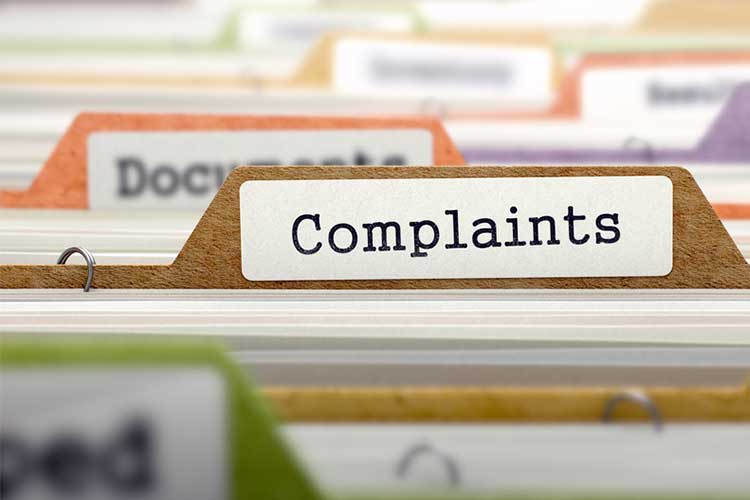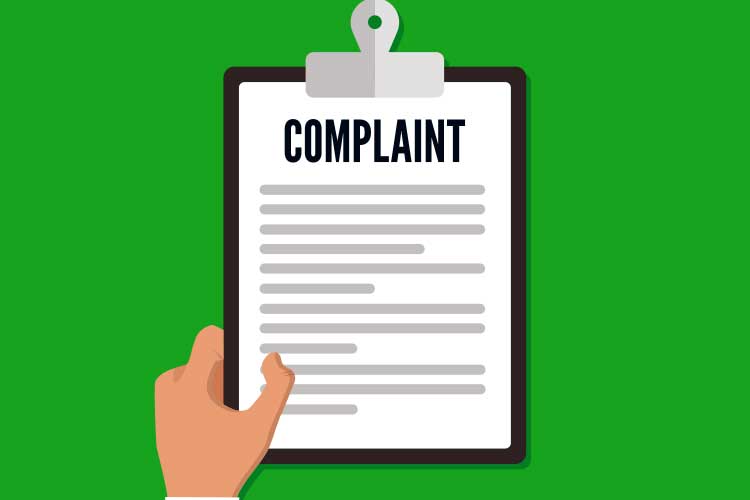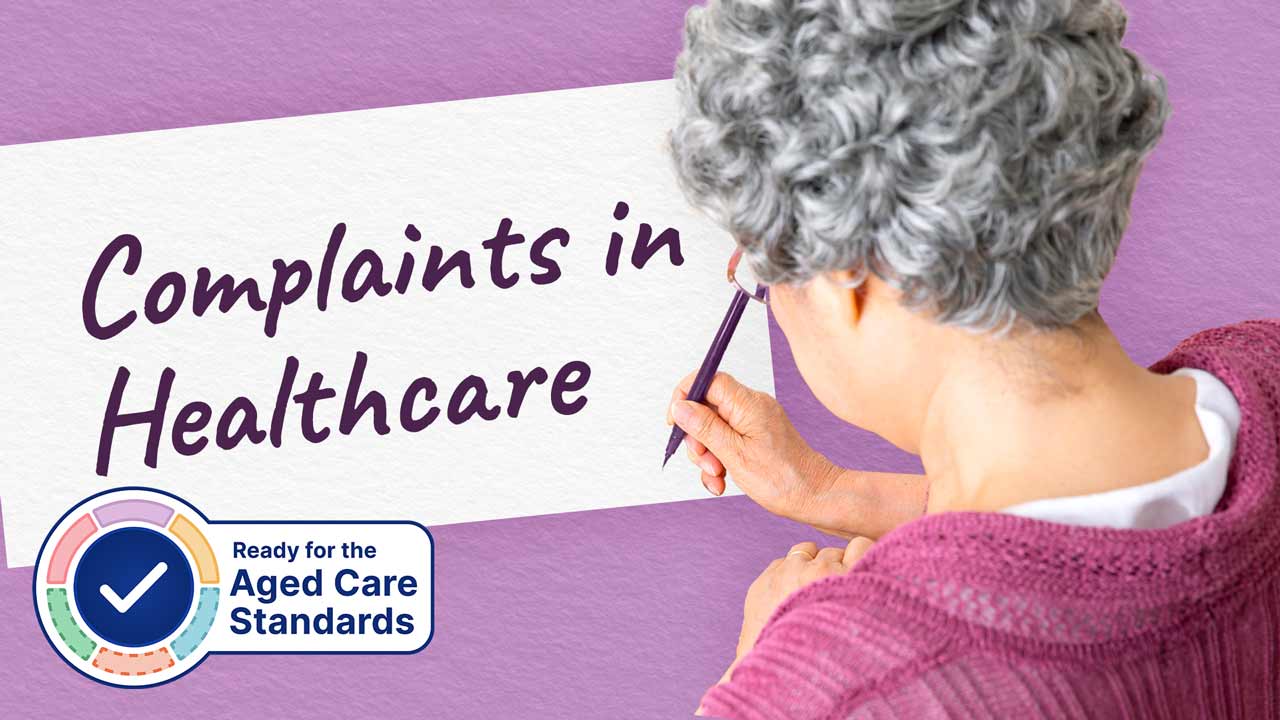Complaints are an integral part of ensuring quality healthcare provision. Knowing how to deal with complaints is crucial for professional growth, but handling the complaints of patients or their visitors can often be complicated and difficult to navigate.
All aged care service providers are required to have internal complaints resolution processes under the Aged Care Act 1997 (ACSQC 2021).
This article addresses the best way to manage common complaints in healthcare settings. A common complaint is one that can be mitigated at a local level (i.e. the unit).
Note: The following advice is not applicable for complaints alleging criminal behaviour nor complaints that relate to breaches in the code of conduct.
What is an Effective Complaint Handling System?
An effective complaint handling system should:
- Ensure issues are addressed adequately and in a timely manner
- Strengthen the relationship between the service provider, care recipient and care recipient’s family and representatives
- Enable continuous service improvement
(ACQSC 2021)
Complaint-Handling Processes
The way in which a practice handles a complaint determines whether or not the practice can claim to be safe and responsive. Providers with efficient complaint-handling processes are best positioned to manage complaints quickly and with ease (HCC n.d.).
An early resolution has the following benefits:
- Feelings of dissatisfaction with the service are less likely to intensify if the process is short
- It may be less likely that the subject of the complaint will be discussed in the community
- A quicker beginning of the complaints process usually means a quicker resolution
- The service and staff are demonstrating they take the complaint seriously
An effective complaint-handling process creates opportunities to restore confidence in your services, increases quality as a result of feedback, and prevents minor issues from escalating into bigger problems (HCC n.d.).

Keep in Mind:
- Complaints are inevitable - everybody has the right to make a complaint
- Complaints are not necessarily bad - in some cases, the complaint may reflect more on the processes than the staff. Support for staff in the event of a complaint is crucial. This support may even build trust in the team
- Complaints are an important aspect of quality improvement - they can be useful in the aim of feedback for improvement
- Complaints give individuals a voice
(Cusack 2019)
Complaints in Healthcare Settings
While blame and complaints occur in most workplaces, healthcare settings are particularly fraught with emotion and fear, and often high expectations on the part of the consumer (Suter 2017).
Your job isn’t to put consumers in their place, but rather, to learn from and reach closure on the complaint as quickly as possible.
Put yourself in their shoes: attending hospital (or another healthcare setting) is a significant emotional event for both patients and their visitors. People who are unwell are particularly vulnerable, and visitors and relatives may be anxious and overly protective.
All people will consider their own complaint issues to be serious; therefore, all issues should be dealt with accordingly.
Complaints in Aged Care
Standard 2: The Organisation - Outcome 2.6: Feedback and complaints management of the strengthened Aged Care Quality Standards sets out the responsibility of aged care providers to support older people, workers and others to give feedback and make complaints (ACQSC 2024).
More specifically, providers are required to:
- Implement a complaints management system for receiving, documenting, replying to and reporting on complaints (Action 2.6.1)
- Support older people, families, carers, workers and others to give feedback and make complaints (Action 2.6.2)
- Support older people to access advocates, language services and other services to assist them in raising and addressing complaints (Action 2.6.3)
- Resolve complaints in a timely manner and follow open disclosure procedures if something goes wrong (Action 2.6.4)
- Gather and assess data about feedback and complaints, which should be reported to the governing body, older people and workers to facilitate continuous improvement (Action 2.6.5)
- Review and improve the complaints management system regularly (Action 2.6.6).
(ACQSC 2024)
Managing the Complaints of a Visitor
Relatives, friends, and visitors need to know how to make complaints. The less time they spend trying to identify how to lodge a complaint and with whom, the less likely the issue is to be embellished or blown out of proportion.
When managing complaints from a relative, friend, or another visitor of a patient, try to be as approachable as possible.
Consider holding a meeting away from the noise and bustle of the ward somewhere that is conducive to a confidential conversation. Assess whether it is necessary for the patient to also be present in the room.
In case the situation escalates, ensure that other staff members know where you are holding the meeting. Consider whether it may be worth having another staff member (or security) present and position yourself safely, between the complainant and the door.
Turn off pagers and mobile phones if possible, sit at the same level as the complainant and ensure you maintain a calm and even voice.
Making Complaints Accessible
Anyone who wishes to complain should be able to easily do so. Accessibility is a key component of an effective complaint management system (ACQSC 2021).
Accessibility can be achieved through:
- Providing information sheets to care recipients and their representatives explaining how to complain
- Publicising your organisation’s complaints policy and contact details
- Actively seeking feedback
- Encouraging care recipients and their representatives to raise concerns
- Gathering feedback in a variety of formal and informal ways (e.g. suggestions boxes, forms, conferences)
- Providing access to advocates and language services.
(ACQSC 2021)
The Complaint Management Process

1. Acknowledging the Complaint
Complaints should be acknowledged in a timely manner. It is important to:
- Outline the complaint process to the complainant
- Encourage the complainant (and their representative if applicable) to participate in the resolution process
- Provide the complainant with the name and contact details of relevant personnel
- Assure the complainant that you will maintain confidentiality
- Provide the complainant with an estimated duration for the complaint resolution process and inform them about when they will next be contacted
(ACQSC 2021)
In some cases, a written acknowledgement may be appropriate. If the complaint was received via mail and can be addressed quickly, it may even be possible to provide the complainant with an acknowledgement and resolution simultaneously (ACQSC 2021).
2. Assessing the Complaint
This step involves:
- Clarifying the specific issue that has been raised by the complainant
- Assessing the level of risk to the wellbeing, safety, and health of those involved in the complaint
- Determining whether any specific aspects of the complaint need to be prioritised
- Communicating with the complainant to determine how they would prefer the issue to be resolved (e.g. apology, change in services, raising awareness of the issue)
- Determining whether any legal representatives need to be consulted
(ACQSC 2021)
Depending on the specific problem and the complainant’s preferences, some issues may be easier to resolve than others. However, if the complainant’s desired outcome is unachievable, you will need to explain why this is the case and offer them alternatives (ACQSC 2021).
Part of the assessment process is planning, i.e. determining how exactly the complaint will be managed. A plan might identify:
- The issues that need to be addressed
- The complainant’s desired resolution and whether it is achievable
- Any information that needs to be gathered and legal representatives that need to be consulted
- An estimate of the time it will take to resolve the issue
- Any special considerations e.g. sensitive or confidential information
(ACQSC 2021)
The care recipient, complainant, and staff should be included in the planning process to ensure that a mutually agreed resolution is determined (ACQSC 2021).
Some complaints may also require investigation, i.e. the gathering of relevant information to help inform an appropriate resolution. Remember to uphold the principles of fair investigation: impartiality, confidentiality, transparency, and timeliness (ACQSC 2021).
3. Responding to the Complaint
Once an appropriate resolution has been determined, the next step is to formally communicate this to the complainant and other parties involved. Depending on the situation, this could be through a conversation or written explanation (ACQSC 2021).
At this stage, you may consider offering an apology to the complainant. Apologising demonstrates empathy and may contribute to a more positive outcome, even if you are not completely at fault. An apology may also lead to an improved relationship between the service provider and complainant (ACQSC 2021).
Note: Apologising is not necessarily an admission of fault, depending on your jurisdiction. For more information, see Ausmed’s Training Module on Open Disclosure and Apology.
4. Following Up the Complaint
Ask the complainant for feedback regarding how their complaint was managed. If the complainant is unsatisfied, you may consider internal reviews, mediation, or other options (ACQSC 2021).
5. Considering the Complaint
When finalising a complaint, always remember that the issue could occur again in the future. It may be beneficial to review policies and procedures or initiate systemic improvements (ACQSC 2021).
Recording Complaints
Record all complaints, detailing at a minimum:
- The date it arrived
- Who sent it
- What the complaint was about
- Who did what about it (investigation-wise)
- How it was actioned
- The outcomes of those actions
- A closure date
(Suter 2017)
Communication is Key
Generally speaking, handling complaints well is underpinned by engaging with consumers about their concerns and working to understand the resolutions they are seeking.
Communication issues are responsible for the majority of complaints, and in many cases, complainants are simply looking for either an explanation or apology (HCC n.d.).
Another common motivation behind complaints is to prevent the same thing from happening to others. This is why it is crucial to acknowledge complaints promptly and let people know what is being done to prevent it from happening again (HCC n.d.).
When engaging with complainants, you should:
- Welcome the complaint, thank the complainant for raising the issue and show eagerness to resolve the problem.
- Be positive, professional, and polite.
- Be empathetic.
- Offer information that may help the complainant gain a better understanding.
- Take notes to better clarify the situation and demonstrate that you are taking the complaint seriously.
- Always respect the complainant’s privacy and dignity.
- Be honest and avoid making promises that cannot be upheld.
- Know how to apologise properly. By saying sorry, you are acknowledging that the complainant is upset and that their grievance/issue matters to you.
- Recognise the mistake and the harm it caused; when apologising, refrain from using cliched phrases.
- Outline clearly to the complainant what is being done to address the complaint in order to be proactive and assure them that their feedback is being taken seriously.
- Clarify and be firm in your explanation about what happened and why.
- Practice active listening.
- Be aware of the body language you are displaying; utilise non-verbal cues such as expressions, movement, gestures and eye contact.
- Recognise and respond to signs of stress from complainants.
- Validate the complainant’s concerns and commit to resolving the issue in a timely manner.
- Be patient; avoid rushing or interrupting the complainant.
- Escalate the complaint if required.
(ACQSC 2021; Cusack 2019; LPLC 2017)
Conclusion
Remember that complaints handling is often targeted by accreditation assessors and concise records will be very useful in this situation, especially when an outcome can show an improved process along the way.
For managers or supervisors, it is vital that the staff trust that you will treat them respectfully and with discretion when questioning their actions, and that you and the staff member plan a suitable improvement plan together. Remind staff of the ratio of complaints to compliments, as in most cases, the compliments outweigh the complaints.
Remember that complaints are to be expected in all healthcare settings. It is not whether you receive complaints, but how you handle them that reflects your practice. Know that there are ample support and resources available to you in the event of receiving a complaint.
Test Your Knowledge
Question 1 of 3
True or false: Legally, an apology is an admission of guilt.
Topics
Further your knowledge
References
- Aged Care Quality and Safety Commission 2021, Better Practice Guide to Complaint Handling in Aged Care Services, Australian Government, viewed 27 November 2023, https://www.agedcarequality.gov.au/resources/better-practice-guide-complaints-handling-aged-care-services
- Aged Care Quality and Safety Commission 2024, Standard 2: The Organisation, Australian Government, viewed 15 April 2024, https://www.health.gov.au/resources/publications/strengthened-aged-care-quality-standards-august-2025?language=en
- Cusack, K 2019, 'Healthcare Complaints and Investigations', Ausmed, 28 February, viewed 7 August 2019.
- Health Complaints Commissioner n.d., Complaint Handling Standards, Victoria State Government, viewed 27 November 2023, https://hcc.vic.gov.au/providers/complaint-handling-standards
- Legal Practitioners' Liability Committee 2017, Why Apologise?, LPLC, viewed 27 November 2023, https://lplc.com.au/uploads/main/Resources/LIJ-Articles/Why-apologise-Dec2017.pdf
- Suter, C 2017, 'Receiving Complaints from a Patient, Relative or Visitor', Ausmed, 6 March, viewed 7 August 2019.
 New
New 

